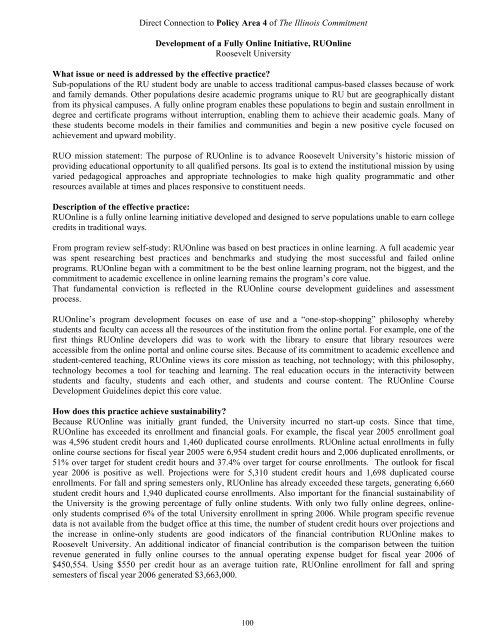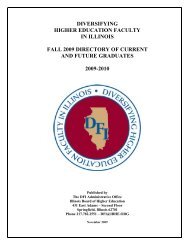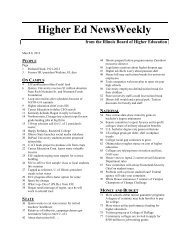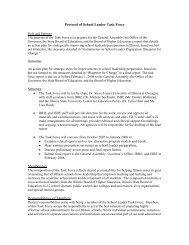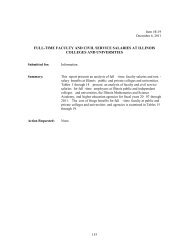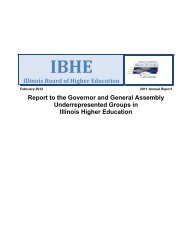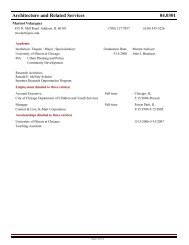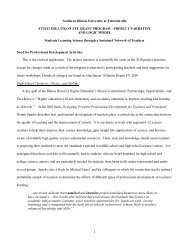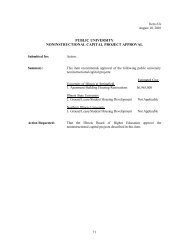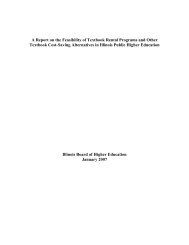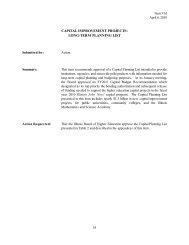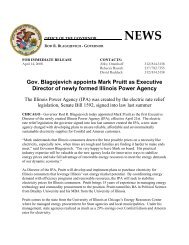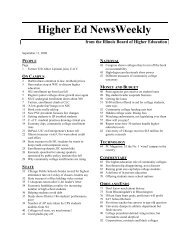Title of Effective Practice: - California Postsecondary Education ...
Title of Effective Practice: - California Postsecondary Education ...
Title of Effective Practice: - California Postsecondary Education ...
You also want an ePaper? Increase the reach of your titles
YUMPU automatically turns print PDFs into web optimized ePapers that Google loves.
Direct Connection to Policy Area 4 <strong>of</strong> The Illinois Commitment<br />
Development <strong>of</strong> a Fully Online Initiative, RUOnline<br />
Roosevelt University<br />
What issue or need is addressed by the effective practice?<br />
Sub-populations <strong>of</strong> the RU student body are unable to access traditional campus-based classes because <strong>of</strong> work<br />
and family demands. Other populations desire academic programs unique to RU but are geographically distant<br />
from its physical campuses. A fully online program enables these populations to begin and sustain enrollment in<br />
degree and certificate programs without interruption, enabling them to achieve their academic goals. Many <strong>of</strong><br />
these students become models in their families and communities and begin a new positive cycle focused on<br />
achievement and upward mobility.<br />
RUO mission statement: The purpose <strong>of</strong> RUOnline is to advance Roosevelt University’s historic mission <strong>of</strong><br />
providing educational opportunity to all qualified persons. Its goal is to extend the institutional mission by using<br />
varied pedagogical approaches and appropriate technologies to make high quality programmatic and other<br />
resources available at times and places responsive to constituent needs.<br />
Description <strong>of</strong> the effective practice:<br />
RUOnline is a fully online learning initiative developed and designed to serve populations unable to earn college<br />
credits in traditional ways.<br />
From program review self-study: RUOnline was based on best practices in online learning. A full academic year<br />
was spent researching best practices and benchmarks and studying the most successful and failed online<br />
programs. RUOnline began with a commitment to be the best online learning program, not the biggest, and the<br />
commitment to academic excellence in online learning remains the program’s core value.<br />
That fundamental conviction is reflected in the RUOnline course development guidelines and assessment<br />
process.<br />
RUOnline’s program development focuses on ease <strong>of</strong> use and a “one-stop-shopping” philosophy whereby<br />
students and faculty can access all the resources <strong>of</strong> the institution from the online portal. For example, one <strong>of</strong> the<br />
first things RUOnline developers did was to work with the library to ensure that library resources were<br />
accessible from the online portal and online course sites. Because <strong>of</strong> its commitment to academic excellence and<br />
student-centered teaching, RUOnline views its core mission as teaching, not technology; with this philosophy,<br />
technology becomes a tool for teaching and learning. The real education occurs in the interactivity between<br />
students and faculty, students and each other, and students and course content. The RUOnline Course<br />
Development Guidelines depict this core value.<br />
How does this practice achieve sustainability?<br />
Because RUOnline was initially grant funded, the University incurred no start-up costs. Since that time,<br />
RUOnline has exceeded its enrollment and financial goals. For example, the fiscal year 2005 enrollment goal<br />
was 4,596 student credit hours and 1,460 duplicated course enrollments. RUOnline actual enrollments in fully<br />
online course sections for fiscal year 2005 were 6,954 student credit hours and 2,006 duplicated enrollments, or<br />
51% over target for student credit hours and 37.4% over target for course enrollments. The outlook for fiscal<br />
year 2006 is positive as well. Projections were for 5,310 student credit hours and 1,698 duplicated course<br />
enrollments. For fall and spring semesters only, RUOnline has already exceeded these targets, generating 6,660<br />
student credit hours and 1,940 duplicated course enrollments. Also important for the financial sustainability <strong>of</strong><br />
the University is the growing percentage <strong>of</strong> fully online students. With only two fully online degrees, onlineonly<br />
students comprised 6% <strong>of</strong> the total University enrollment in spring 2006. While program specific revenue<br />
data is not available from the budget <strong>of</strong>fice at this time, the number <strong>of</strong> student credit hours over projections and<br />
the increase in online-only students are good indicators <strong>of</strong> the financial contribution RUOnline makes to<br />
Roosevelt University. An additional indicator <strong>of</strong> financial contribution is the comparison between the tuition<br />
revenue generated in fully online courses to the annual operating expense budget for fiscal year 2006 <strong>of</strong><br />
$450,554. Using $550 per credit hour as an average tuition rate, RUOnline enrollment for fall and spring<br />
semesters <strong>of</strong> fiscal year 2006 generated $3,663,000.<br />
100


